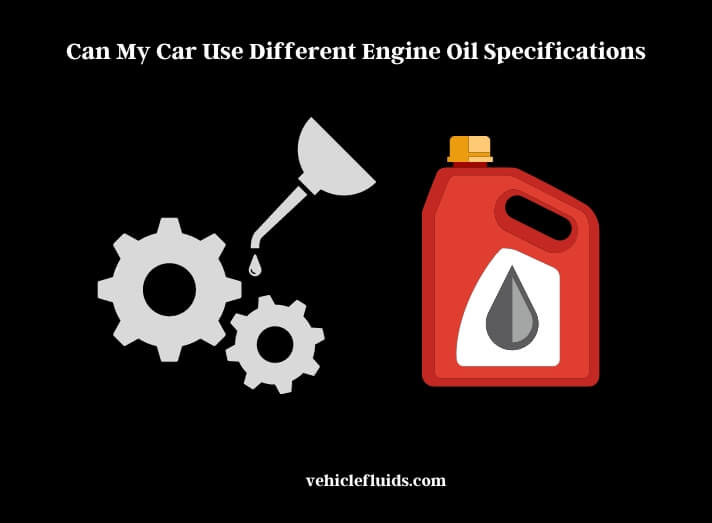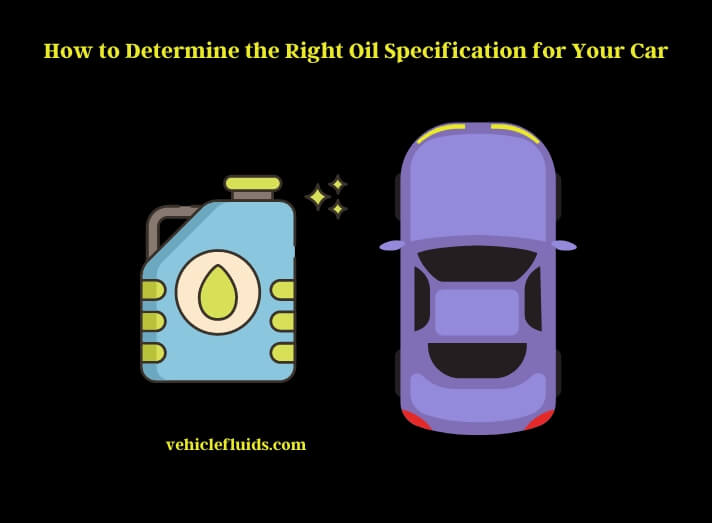Engine oil is an essential component of a car’s engine, playing a crucial role in lubricating and protecting its moving parts. Using the right engine oil is critical to keeping a car running smoothly and preventing damage to the engine. With so many different types of engine oil available, it can be challenging to know which specification to use.

One common question that arises is whether it’s safe or advisable to use different oil specifications in a car. For example, can a car that requires a certain API oil specification use a different one instead? Can a car that is designed for a specific viscosity grade use a different one? These are important questions to consider, as using the wrong engine oil specification can have serious consequences for a car’s performance and longevity.
Engine Oil Specifications
Engine oil specifications are standards that define the characteristics of engine oils. These standards are established by various organizations and governing bodies, including the Society of Automotive Engineers (SAE) and the American Petroleum Institute (API).
One of the most critical factors in engine oil specifications is viscosity, which is the oil’s resistance to flow. The viscosity grade of an oil is typically expressed as a number followed by the letter “W” (which stands for winter). For example, 10W-30 oil is commonly used in cars and has a viscosity grade of 10 in cold temperatures and 30 in hot temperatures.
Engine oil specifications also include performance ratings that measure the oil’s ability to protect the engine from wear, reduce deposits, and resist oxidation. For example, the API has established a service rating system that includes several categories, such as “SN” for gasoline engines and “CK-4” for diesel engines.
Different car manufacturers may have specific engine oil specifications for their vehicles, which can vary depending on factors such as the engine design and the intended driving conditions. It’s important to consult the owner’s manual or a trusted mechanic to determine the correct engine oil specification for your car.
Using the wrong engine oil specification can lead to reduced engine performance, increased wear and tear, and even engine damage. For example, using an oil with a viscosity grade that is too high can increase engine friction and cause excess heat, while using an oil with a performance rating that is too low may not provide adequate protection against wear and deposits.
Can Different Oil Specifications be Used?
The question of whether different engine oil specifications can be used in cars is a complex one. On the one hand, using an oil that does not meet the manufacturer’s recommended specifications can lead to serious problems such as engine damage or reduced performance. On the other hand, there may be situations where using a different oil specification is necessary or beneficial.
One situation where using a different oil specification may be necessary is when the recommended oil is not available. In some cases, the manufacturer-recommended oil may not be available in a particular region or may be out of stock. In these situations, it may be necessary to use a different oil specification that meets similar standards.
Another situation where using a different oil specification may be beneficial is when driving conditions differ from the manufacturer’s recommendations. For example, if you regularly drive in extremely cold temperatures, you may want to consider using an oil with a lower viscosity grade than what the manufacturer recommends. Similarly, if you frequently tow heavy loads or drive in dusty conditions, you may want to consider using an oil with a higher performance rating to provide additional protection against wear and deposits.
It’s essential to note that using a different oil specification in these situations should only be done after consulting with a trusted mechanic or the manufacturer’s technical support team. They can help determine if using a different oil specification is safe and appropriate for your car and provide guidance on which specifications to use.
How to Determine the Right Oil Specification for Your Car
Determining the right engine oil specification for your car is essential for ensuring proper engine performance and longevity. Here are some steps you can take to determine the right oil specification for your car:

Check the Owner’s Manual
The first and most critical step is to check the owner’s manual that came with your car. The manual will typically provide specific recommendations for the type and viscosity of oil to use in your car’s engine. It will also include any performance ratings required by the manufacturer.
Consider Driving Conditions
In addition to the manufacturer’s recommendations, you should also consider your driving conditions. If you frequently drive in extreme temperatures, you may want to consider using a different viscosity grade oil. Similarly, if you drive in dusty or dirty conditions or tow heavy loads, you may want to consider using an oil with a higher performance rating.
Consult a Trusted Mechanic
If you’re unsure about which engine oil specification to use or if your driving conditions require a different specification, it’s always a good idea to consult a trusted mechanic. They can provide valuable insights and recommendations based on your specific car and driving habits.
Check Oil Packaging
When purchasing engine oil, be sure to check the packaging to ensure that it meets the required specifications. Look for labels and symbols indicating that the oil meets the appropriate API or other standards.
It’s important to note that using the wrong engine oil specification can lead to serious engine problems and expensive repairs. As such, it’s always best to use the recommended oil specification whenever possible. If you need to use a different specification, make sure that it meets the appropriate standards and is recommended by the manufacturer or a trusted mechanic. By taking these steps, you can ensure that your car’s engine is properly lubricated and protected for optimal performance and longevity.
What Happens If You Use the Wrong Engine Oil
Using the wrong engine oil specification can have serious consequences for your car’s engine. Here are some potential problems that can occur:
Reduced Engine Performance
Engine oil is responsible for lubricating and protecting the engine’s moving parts. Using the wrong oil specification can lead to increased friction and wear, which can cause reduced engine performance and efficiency.
Engine Damage
If the oil used in the engine does not meet the manufacturer’s recommended specifications, it may not provide adequate protection against wear and deposits. Over time, this can lead to significant engine damage and the need for costly repairs.
Increased fuel consumption: Using the wrong engine oil specification can also lead to increased fuel consumption. When the engine is not properly lubricated, it has to work harder to perform the same tasks, which can result in higher fuel consumption and lower fuel efficiency.
Decreased Engine Lifespan
If the wrong engine oil specification is used for an extended period, it can lead to premature engine wear and decreased lifespan. Over time, this can lead to the need for costly repairs or even engine replacement.
Warranty Issues
Using the wrong engine oil specification can also void your car’s warranty. If the engine is damaged as a result of using the wrong oil specification, the manufacturer may not cover the cost of repairs.
It’s crucial to ensure that you use the right engine oil specification for your car. If you’re unsure which specification to use, consult your owner’s manual, a trusted mechanic, or the manufacturer’s technical support team. Using the wrong oil specification can lead to serious engine problems and costly repairs, so it’s always better to err on the side of caution and use the recommended specification.
Can You Mix Different Types of Engine Oil?
It’s generally not recommended to mix different types of engine oil. Engine oils are formulated with specific additives and base oils to meet specific performance requirements. Mixing different types of oil can compromise the oil’s ability to lubricate and protect the engine’s moving parts.
However, there may be situations where mixing different types of oil is unavoidable, such as when topping off the oil level or in emergency situations. In these cases, it’s important to follow some guidelines to minimize the risk of engine damage:
Use the same viscosity: If you must mix different types of oil, use oils with the same viscosity. Mixing oils with different viscosities can result in an inconsistent flow of oil, which can lead to increased engine wear and reduced performance.
Use the same specification: Mixing oils with different specifications can also lead to problems, as different oils may contain different additives or performance ratings. To avoid any potential issues, use oils that meet the same specifications as recommended by the manufacturer.
Use only small amounts: If you must mix oils, use only small amounts. Adding too much of one oil can alter the oil’s overall performance, leading to potential engine problems.
Get a professional opinion: If you’re unsure about whether to mix oils or what types of oil to use, it’s always best to consult a trusted mechanic or the manufacturer’s technical support team.
In general, it’s best to avoid mixing different types of engine oil whenever possible. Using the same type and specification of oil can help ensure consistent engine performance and protection. If you must mix oils, follow the guidelines above to minimize the risk of engine damage.
Conclusion
Using the right engine oil specification is crucial for maintaining your car’s engine health and performance. It’s important to follow the manufacturer’s recommendations when selecting engine oil to ensure that it meets the required performance standards. While mixing different types of oil is generally not recommended, there may be situations where it is necessary, but it’s important to follow guidelines to minimize the risk of engine damage.
Using the wrong engine oil specification can result in reduced engine performance, increased fuel consumption, and even serious engine damage. It can also void your car’s warranty. It’s always best to err on the side of caution and use the recommended engine oil specification. If you’re unsure which specification to use, consult your owner’s manual, a trusted mechanic, or the manufacturer’s technical support team.
